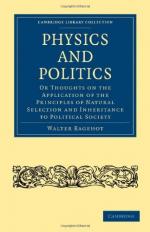14. We are told that the famous tragedies show us the struggle of man against Fate. I believe, on the contrary, that scarcely a drama exists wherein fatality truly does reign. Search as I may, I cannot find one which exhibits the hero in conflict with destiny pure and simple. For indeed it is never destiny that he attacks; it is with wisdom he is always at war. Real fatality exists only in certain external disasters-as disease, accident, the sudden death of those we love; but inner fatality there is none. Wisdom has will power sufficient to rectify all that does not deal death to the body; it will even at times invade the narrow domain of external fatality. It is true that we must have amassed considerable and patient treasure within us for this will power to find the resources it needs.
15. The statue of destiny casts a huge shadow over the valley, which it seems to enshroud in gloom; but this shadow has clearest outline for such as look down from the mountain. We are born, it may be, with the shadow upon us; but to many men is it granted to emerge from beneath it; and even though infirmity or weakness keep us, till death, confined in these sombre regions, still we can fly thence at times on the wings of our hopes and our thoughts. There may well be some few over whom Fate exerts a more tyrannous power, by virtue of instinct, heredity and other laws more relentless still, more profound and obscure; but even when we writhe beneath unmerited, crushing misfortune; even when fortune compels us to do the thing we should never have done, had our hands been free; even then, when the deed has been done, the misfortune has happened, it still rests with ourselves to deny her the least influence on that which shall come to pass in our soul. She may strike at the heart that is eager for good, but still is she helpless to keep back the light that shall stream to this heart from the error acknowledged, the pain undergone. It is not in her power to prevent the soul from transforming each single affliction into thoughts, into feelings and treasure she dare not profane. Be her empire never so great over all things external, she always must halt when she finds on the threshold a silent guardian of the inner life. And if it be granted her then to pass through to the hidden dwelling, it is but as a bountiful guest she will enter, bringing with her new pledges of peace: refreshing the slumberous air, and making still clearer the light, the tranquillity deeper—illumining all the horizon.
16. Let us ask once again: what had destiny done if she had, by some blunder, lured Epicurus, or Marcus Aurelius, or Antoninus Pius into the snares that she laid around Oedipus? I will even assume that she might have compelled Antoninus, for instance, to murder his father, and, all unwittingly, to profane the couch of his mother. Would that noble sovereign’s soul have been hopelessly crushed? Would the end of it all not have been as the end of all dramas must




